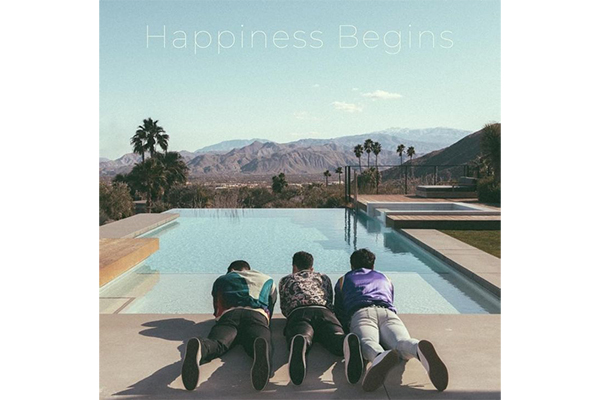The Jonas Brothers are finally back, and no one could be more excited than the fan base which splattered its childhood rooms with J-14 posters. In 14 songs, the Disney Channel heartthrob trio brings a mature sound while riffing on nostalgia to make their return a pop culture event.
It has been a decade since the release of the Jonas Brothers’ last album Lines, Vines, and Trying Times. In that time, Joe married the Queen of the North, Nick has starred alongside action film heroes Dwayne Johnson and Kevin Hart and who knows what Kevin has been up to. Their fifth studio album Happiness Begins chronicles their journey from adolescence to adulthood.
The first track, which also happens to be one of the lead singles, is arguably the best song of the album. “Sucker” brings the listener into the Jo-Bro’s new sound and shows them what the brothers have been up to since their breakup period.
Hoping to ditch the virgin boy sound, the dark-haired trio sings, “I’ve been dancing on top of cars and stumbling out of bars. I follow you through the dark, can’t get enough,” detailing the late nights they spent in pursuit of their love interests.
After saying goodbye to the old Jonas Brothers, the group take listeners through three key aspects of their new lives: growing up, women and happiness.
“Sucker” sets the tone of the album as the Jonas Brothers continue to explore the idea of growing up and finding yourself. “Cool,” “Only Human” and “Used to Be” are songs that delve deeper into the Jo-Bro’s lives as they explore confidence, loss and uncertainty. The brothers make use of the modern pop sound in “Used to Be” as they infuse R&B into their rhythms and establish a more mature sound.
As the band continues to demonstrate their versatility and range, the album begins to fall off and sound like a generic knockoff version of the Jonas Brothers. After a couple of songs, the album hits a point where every song falls flat and meshes into a reincarnation of the previous song.
The album takes a turning point for the better when the Jonas Brothers sing about finding their lovebugs, but more so about doing what is necessary to maintain a relationship in the modern era. “Love Her” and “Trust” ditch the optimistic notions of young love and provide a more grounded take on what it means to fall in love and accept blame for their shortcomings.
Nick and Joe explore uncharted territory in Jo-Bro lore as their lyricism carries more weight and delves deeper into their beliefs and experiences.
“Happy When I’m Sad” is a high point in the album. It addresses fame during the peak of their careers. “Can’t look how we made it, say ‘Congratulations,’ Lookin’ like I’ll never be lonely again. See me in the mirror, nothin’ ever changes. Never see the sunset, only in my head.”
The album ends with “Hesitate,” “Rollercoaster” and “Comeback,” which talk about gathering all of their experiences and using them to change and improve their past selves. The Jonas Brothers use their final minutes on the album to shed light on letting go of fear and flowing with the waves of change.
Overall, Happiness Begins is more than a nostalgic attention-getter. The album offers insight on growth and change, providing a more holistic picture of the realities of finding purpose after fame. Although the album falls short in terms of material and most of the tracks fail to compare to the opener, Happiness Begins is a typical summer album that is guaranteed to get serious radio play.
3/5 stars
Runtime: 43 min. And 50 sec.





















